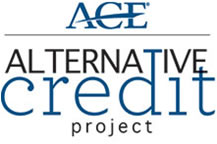Fifteen More Institutions Join ACE's Alternative Credit Consortium
 WASHINGTON, DC – The American Council on Education (ACE) has announced that an additional 15 colleges and universities have joined the second wave of ACE's alternative credit consortium. The selected institutions have demonstrated a strong commitment to access and attainment, particularly in the area of serving non-traditional students.
WASHINGTON, DC – The American Council on Education (ACE) has announced that an additional 15 colleges and universities have joined the second wave of ACE's alternative credit consortium. The selected institutions have demonstrated a strong commitment to access and attainment, particularly in the area of serving non-traditional students.
The participating institutions are:
Ashford University (CA); Bellevue University (NE); Brandman University (CA); Colorado State University-Global Campus; Dallas Colleges Online/Dallas County Community College District (TX); Davenport University (MI); Franklin Pierce University (NH); Miami Dade College (FL); Monroe Community College (NY); Post University (CT); Sinclair Community College (OH); Stark State College (OH); University of New England (ME); Walden University (MN); Youngstown State University (OH).
ACE launched the alternative credit project in December 2014, with an initial selection of 25 colleges and universities, as part of an innovative initiative to create a more flexible pathway toward a college degree for millions of non-traditional students. ACE sought proposals for additional consortium members from two- and four-year institutions, public and private, ACE members and non-members.
"This project already is yielding enormous benefits, adding to our body of knowledge about the most effective ways to go about increasing the number of Americans able to earn a college degree or credential by using education, training and life experiences gained outside of a formal higher education classroom," says ACE President Molly Corbett Broad.
Participating colleges and universities in the consortium agree to accept all or most of the transfer credit sought by students who successfully complete courses that are part of a selected pool of about 100 low-cost or no-cost lower division general education online courses.
"We appreciate the commitment on the part of these institutions, and the ongoing commitment of our original consortium members to this work, which will help lead to the greater acceptance of alternative forms of credit in a way that ensures quality and encourages more people to complete their postsecondary education," says Deborah Seymour, ACE assistant vice president for education attainment and innovation.
ACE will be collecting anonymized data from participating institutions regarding the amount of credit each institution accepts through this project as well as progress and success rates of students who transfer in consortium-approved courses.
The project is made possible by a $1.89 million grant from the Bill & Melinda Gates Foundation.
For more information, email: [email protected].